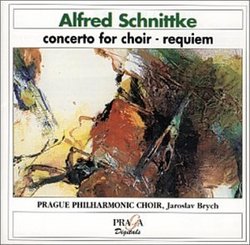Two remarkable choral works
Mark Swinton | 01/20/2001
(4 out of 5 stars)
"Alfred Schnittke was among the most original composers of the twentieth century. This recording by the Prague Philarmonic Choir presents two substantial works for choir, each one a masterpiece in its own way as well as exemplifying the composer's distinctive style.As a strong choral music enthusiast, I find the "Concerto for Choir" to be unlike anything I've heard before - whilst being like a lot of things I have heard before. This seems a paradoxical way to explain the piece, but it is the only way that seems right. In that it sets sacred Russian texts to lush, dramatic choral textures, it is like any number of widely-acclaimed choral masterworks (an example being Rachmaninov's "All Night Vigil"). However, nothing in it can be expected or anticipated: the chorus is unaccompanied throughout, thus the "concerto" element is created by exploring a large number of virtuosic vocal displays, as well as by following a strict form with repeating elements, just like a traditional concerto for instruments. The range required by the voices takes them to their respective limits (the high sopranos produce passionate high Cs whilst the basses descend frequently to infernal Ds); as is typical of Schnittke, the work also includes dense note clusters, produced by dividing the choir into a total of sixteen parts. Sometimes, members of the choir provide an accompaniment to others (there are also fleeting but memorable passages for actual soloists); in the main, a rich mixture of tonal and atonal idioms are presented through polyphonic effects not dissimilar to those used by Renaissance composers or more recent composers of sacred music such as John Tavener. Schnittke approaches the texts (varied texts of praise and lamentation) in a seemingly liberal way: in places, the music simply projects the words, whilst in others the words spawn musical settings that are striking and moving all at once. In short, this is a very special kind of musical work - part concert work, part sacred work; part innovation in a familiar genre, part rehashing of traditional choral ideas; part expression of uncompromising faith, part setting of sacred texts for aesthetic value. Under Jaroslav Brych, the Prague Philarmonic Choir does it full justice. Well worth the price of the disc, although on listening to it, I have to say I would probably enjoy it more if it were performed in front of me (or else I were performing in it myself)...The "Requiem" shares a few traits with the "Concerto," albeit the effect is more dramatic, even shocking. The choir is joined by a bizzare orchestra consisting predominantly of percussion instruments, with various brass instruments, piano and organ alongside. Again, there are aspects of this music that appear familiar and unfamiliar: the treatment of the "Dies irae" sequence receives much attention by the composer, with shrieking brass, apocalyptic organ noises and heavy banging on the percussion; there are also very disturbing moments in which the chorus chants the words tonelessly or else sings them with awesome power. The quieter sections ("Lacrymosa" in particular) are haunting, making use of vocal soloists and extremely subtle instrumental writing. Musically, there is a great deal more variety evident in this work than in the "Concerto," and a great deal more control is needed from the performers - this is just as well-achieved.The liner notes provide excellent commentary on the music, which amounts to a full hour's worth of listening.Fans of Schnittke looking for one or both of these very important oeuvres should choose this one without hesitation; as far as I can tell, it represents best value for money (as opposed to the two Chandos recordings of the "Concerto," one of which is a stand-alone and the other of which is coupled with another work). If you're curious, this is worth a try, although the "Concerto" is on the whole more digestible in one sitting than the "Requiem.""


 Track Listings (18) - Disc #1
Track Listings (18) - Disc #1